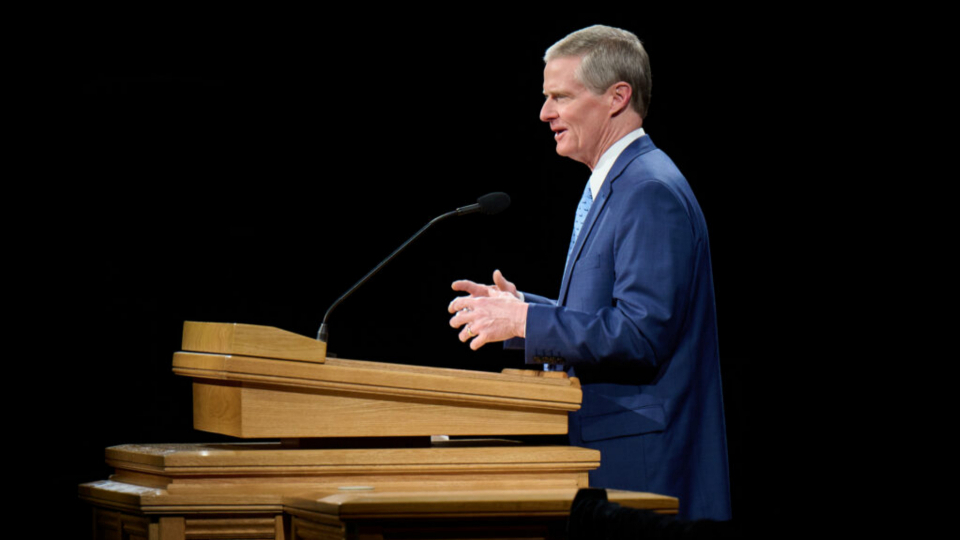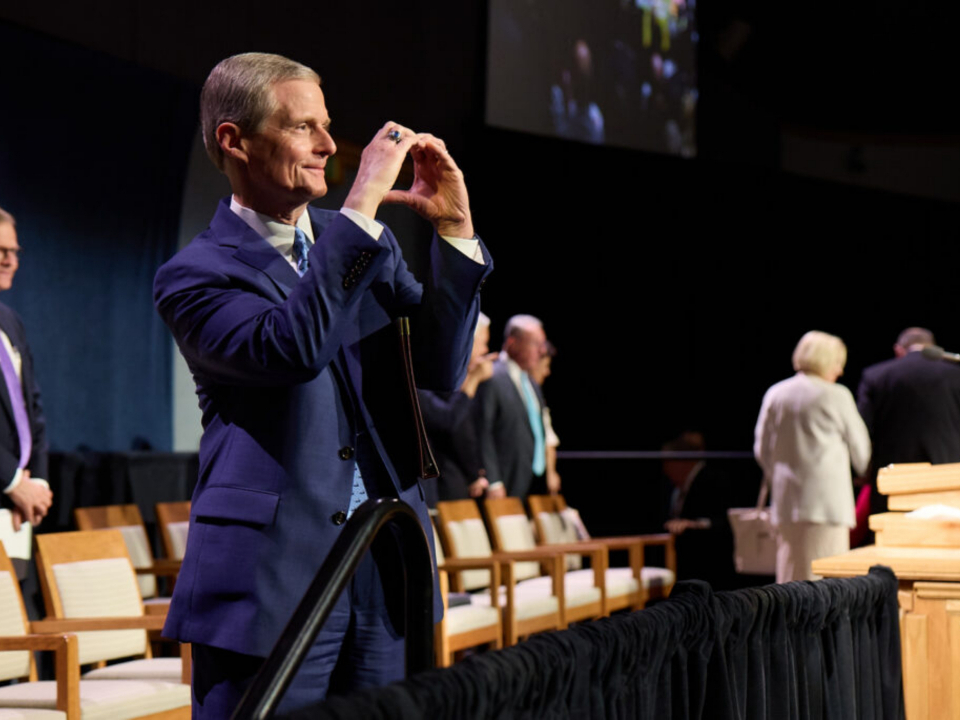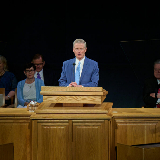| Forming a heart with his hands, Elder David A. Bednar acknowledges the missionaries and new mission leaders as he leaves the June 24, 2022, devotional at the Provo Missionary Training Center in Provo, Utah. 2022 by Intellectual Reserve, Inc. All rights reserved. | 1 / 10 |
This story appears here courtesy of TheChurchNews.com. It is not for use by other media.
By Scott Taylor, Church News
Elder David A. Bednar of the Quorum of the Twelve Apostles looked over the 650 young full-time missionaries of The Church of Jesus Christ of Latter-day Saints attending the Friday night, June 24, devotional at the Provo Missionary Training Center.
Having turned 70 years old earlier in the month, Elder Bednar estimated he was approximately 50 years older than most of the young missionaries. He mentioned that 50 years ago, he was beginning the second year of his mission in southern Germany.
He noted the age difference as providing context for his message — the blessings and joy one receives when obeying God’s commandments.

Bednar-MTC-Devotional
Elder David A. Bednar of the Quorum of the Twelve Apostles speaks at a devotional at the Provo Missionary Training Center on June 24, 2022, in Provo, Utah.2022 by Intellectual Reserve, Inc. All rights reserved.Over those 50 years, he has observed, counseled with and learned from three groups of people — faithful disciples of Christ who have diligently obeyed His commandments, individuals who have not obeyed commandments, and “prodigal sons and daughters” who after not keeping commandments have returned to “the fold of God.”
“Given that background, I want to share with you several key lessons I have learned about the law of obedience,” Elder Bednar said. “And I hope I can encourage you to think about this vital truth in different ways.”
Those in attendance for the devotional also included members of the Quorum of the Twelve Apostles, other attending General Authorities and General Officers, the 168 couples attending the 2022 Seminar for New Mission Leaders, and other training missionaries in MTCs worldwide, which received the devotional via streaming.
7 Lessons About the Law of Obedience
Over nearly 40 minutes, Elder Bednar detailed seven important lessons he has learned about the law of obedience over the past 50 years:
1. The law of obedience is best understood within the context of Heavenly Father’s plan of happiness and the atoning sacrifice of the Lord Jesus Christ.
Elder Bednar read Abraham 3:24 — “We will prove them herewith, to see if they will do all things whatsoever the Lord their God shall command them” — and added, “The commands, or commandments, of God are the instructions, directives, laws and requirements He gives to His children that enable them to grow and develop spiritually in mortality.”
2. Obedience is the exercise of moral agency to learn about, understand and live according to God’s commandments.
“Adherence to gospel truths and keeping the commandments are not confining constraints we must somehow suffer through during mortality,” Elder Bednar said. “Rather, Heavenly Father’s commands are liberating and enlivening. Obedience to eternal laws is the ultimate source of true happiness. Enduring joy is the precious fruit of willful obedience.”
Sin is the exercise of moral agency to deliberately defy and disobey Heavenly Father’s instructions and directives, he said, with willfully failing to act righteously despite a knowledge of the truth likewise a sin.
“Disobedience is rebellion against God and His purposes and causes us to distance ourselves from the influence of the Holy Ghost,″ he said, underscoring that “that the Holy Ghost does not leave us; rather, through disobedience we withdraw ourselves from the influence of the Holy Ghost.”

Bednar-MTC-devotional
Missionaries listen during the June 24, 2022, devotional at the Provo Missionary Training Center in Provo, Utah.2022 by Intellectual Reserve, Inc. All rights reserved.
3. Obedience is connected with and central to all gospel truths and principles.
“The power of the Savior’s gospel to transform and bless us flows from discerning and applying the interrelatedness of its doctrine, principles and practices,” he said. “Only as we ‘gather together in one all things in Christ’ (Doctrine and Covenants 121:29), with firm focus upon Him, can gospel truths synergistically enable us to become what God desires us to become and endure valiantly to the end.
“Over the last 50 years, I have learned that the spiritual power and beautify of the restored gospel of Jesus Christ is evident in the comprehensive connectedness of the doctrine and principles.”
4. We should not focus upon obedience as an isolated law that stands independent and by itself.
He invited his listeners to never focus upon the law of obedience as being isolated and standing independent of itself. “Help the people you teach to recognize that obedience is a capstone law that brings clarity and unity to all other gospel truths.”One’s individual experiences with and understanding of the law of obedience changes by gaining additional light and knowledge, with spiritual desires and expectations maturing while faithfully obeying God’s commandments, he said.
For example, obedience to qualify for and receive blessings for oneself is good, but obedience as a preparation to serve and bless others is much better — as is obeying because of one’s love of the Lord, rather than obedience out of a sense of duty.
Likewise, complying with a commandment’s requirements is good, while accepting and submitting to the Lord’s will and timing is even better — as is becoming inwardly what the commandments intend to help one become, rather than merely performing the outward actions of obedience.
“By and through the power of the Holy Ghost,” Elder Bednar said, “we ultimately can learn to love obeying and living God’s commands. I pray you will hear and remember this important lesson.”

Bednar-MTC-devotional
Elder David A. Bednar speaks at a devotional at the Provo Missionary Training Center on June 24, 2022, in Provo, Utah.2022 by Intellectual Reserve, Inc. All rights reserved.5. Obedience is not transactional but transformational.
Elder Bednar defined transactional obedience as a type of cause-and-effect exchange, believing that obedience to commandment A results in blessing B. But that primary understanding can be incomplete and misguided.
“While keeping the commandments obviously is better than not keeping the commandments, doing so principally for self-centered and even selfish reasons is not the final spiritual destination for which we should strive,” he said.
If promised blessings are not exactly what, when and how they are expected, one may charge God foolishly for not fulfilling His promises.
A higher and holier purpose for obeying God’s commandments is spiritual transformation, he said.
“Transformational obedience requires much more than self-interest or a keen sense of family tradition or religious duty; rather, it derives from our love of God,” he said. “The Savior said, ‘If ye love me, keep my commandments’ (John 14:15).”
6. Willing and heartfelt obedience yields the blessing of ‘commandments not a few’ (Doctrine and Covenants 59:4).
Of the Doctrine and Covenants 59:4 phrase “and with commandments not a few,” Elder Bednar said, “I find it fascinating that one of the greatest blessings related to keeping God’s commandments is additional commandments.”
While those who find commandments restrictive and constraining will not regard more as a blessing, “individuals who have eyes to see and ears to hear will readily recognize the consummate spiritual benefit that comes from additional direction from heaven,” he said.
“The very individual and personal commandments ‘not a few’ we receive frequently tend to focus upon the good things we can and should do to develop and deepen our discipleship — as opposed to focusing primarily upon the bad things we must avoid or overcome. Such heavenly instructions typically are proactive and anticipatory in nature.”
7. Intelligence, defined as applying what we know for righteousness, is obtained through obedience.
Elder Bednar pointed out that in Doctrine and Covenants 93:36, one of the meanings of “intelligence” is the application of knowledge for righteous purposes.
And citing Doctrine and Covenants 130:18-19, he noted the instructive order in which “knowledge” and “intelligence” are listed as well as the parallel sequencing where knowledge is associated with diligence and intelligence is linked to obedience.

Bednar-MTC-devotional
Missionaries listen during the June 24, 2022, devotional at the Provo Missionary Training Center in Provo, Utah.2022 by Intellectual Reserve, Inc. All rights reserved.
“Intelligence is faithfully obeying God’s commandments and applying the principles of the Savior’s gospel in our lives. Obedience is the means whereby you can learn in mortality the things that truly matter the most in eternity.”
An Invitation, Blessing and Witness
“One of the deepest desires of my heart is that each of you will learn your own personal lessons about the law of obedience and receive the enduring joy that comes only to those who love God and keep His commandments,” said Elder Bednar.
He invoked an apostolic blessing upon his listeners, “that you may discover, understand and appreciate ‘the blessed and happy state’ (Mosiah 2:41) of those that keep God’s commandments.
“I joyfully witness that Heavenly Father is the author of the plan of happiness, and Jesus Christ is His Only Begotten and Beloved Son. And I testify that through the Atonement of Christ, all mankind may be saved, by obedience to the laws and ordinances of the gospel.”
‘Remember’

Bednar-MTC-devotional
Sister Susan Bednar speaks at a devotional at the Provo Missionary Training Center on June 24, 2022, in Provo, Utah.2022 by Intellectual Reserve, Inc. All rights reserved.Prior to his message, Elder Bednar invited his wife, Sister Susan Bednar — whom he introduced as personifying virtue — to speak. She spoke of listening to a convert wondering and worrying about the missionary who taught and baptized him and his family, who had since fallen away from the Church. She suggested the inactive returned missionary had failed to remember important spiritual moments and progressions in his life.
“I truly believe that staying on the covenant path has something to do with remembering. Could it be that the missionary who fell away didn’t take time each day to remember the Lord by doing the simple things that are such great benefits to us?” she asked, then listing efforts that include studying the scriptures, praying, attending the temple, partaking of the sacrament and honoring covenants.
“How many of you remember when you put in your missionary papers?” Sister Bednar asked. “How many of you remember the night you opened your call? How many of you remember the day you received your endowment and were ‘endowed with power from on high’? And how many of you will remember this MTC experience tonight? …
“Please remember, remember who you are, remember what you stand for, remember that you have a testimony of the gospel of Jesus Christ.”












